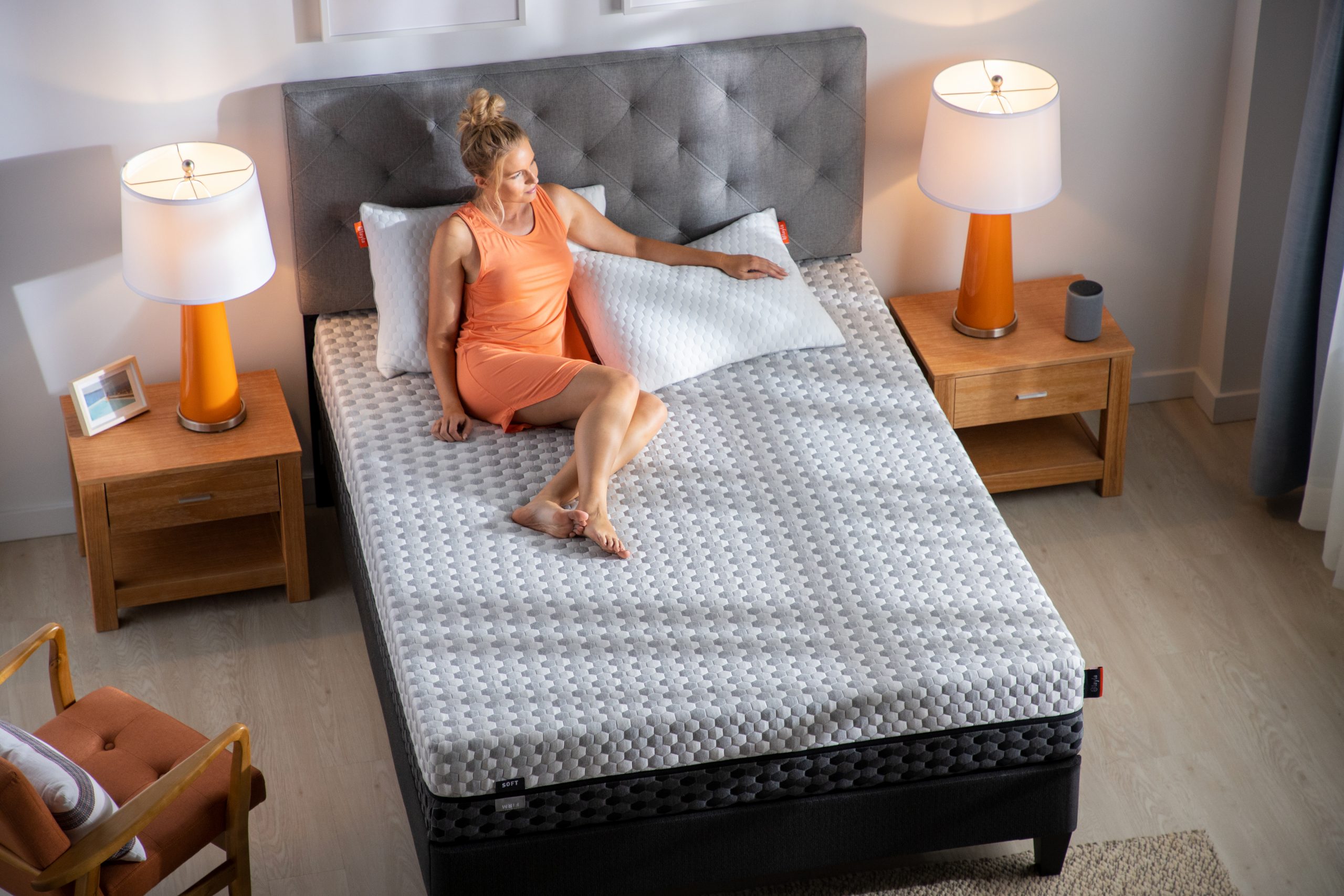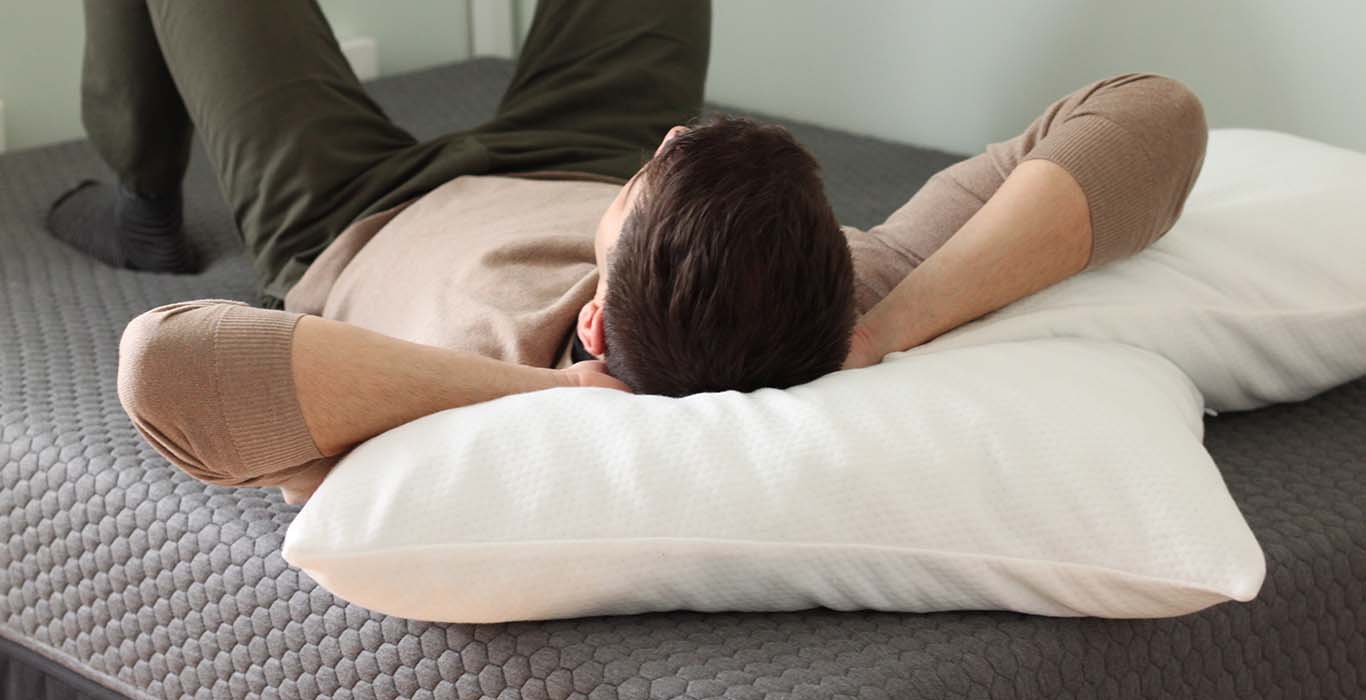As you shop for a new mattress, it’s important to know where your money’s going. While it may be enticing to go the affordable route, sometimes it’s best to make a bigger investment when it comes to buying a new bed. After all, you spend a third of your life sleeping, so skimping on your mattress can make the other two-thirds of your life less than ideal. We all know the feeling of getting through a day after a poor night’s sleep—groggy, irritable, unproductive. A mattress that suits your needs can help rid you of the side effects of a restless night.
Two of the most popular mattress types today are memory foam mattresses and hybrid mattresses. But what’s the difference between a memory foam and a hybrid mattress? That’s what we’re going to cover below. From how each type of mattress is made to the pros and cons of both hybrid and memory foam mattresses, we’ll answer all of your pressing questions to help you make the right decision.

Memory Foam vs. Hybrid Mattress
The modern spring mattress came to fruition in the 1800s. Prior mattresses were made from wool, and even hay! Talk about a scratchy sleep. Fast forward to the 1900s, and innerspring mattresses went into mass production. From that time onward, innerspring mattresses have been the gold standard for mattresses, with few significant alterations occurring over the century.
However, innerspring mattresses are facing more competition today from new mattress types, most notably hybrid and memory foam mattresses. Below, you’ll see the difference between memory foam and hybrid mattresses to help you make an informed purchasing decision.
What is a Memory Foam Mattress?
NASA invented memory foam in the 1970s. Memory foam was designed to improve seat cushioning on airplanes and to enhance crash protection for pilots and passengers. Over time, however, memory foam proved to be a great material for a variety of other purposes, such as padding in helmets, cushioning in shoes, and the mattresses and pillows we sleep on every night.
Memory foam is made from a viscoelastic substance. Viscoelastic foam is made from organic compounds to create polyurethane, which forms a soft surface that can contour to your body.
Have you ever seen a commercial in which someone places a glass of water on their mattress, then jumps up and down? While watching, you probably noticed the glass of water doesn’t spill, no matter how hard the person bounces. That’s because memory foam has a slow response and low resistance, limiting the transfer of movement.
Memory foam mattresses are also made from different densities of foam. These varied densities keep motion transfer at a minimum, so if you have a partner who tosses and turns throughout the night, you won’t be bothered. Memory foam, aka the relationship saver.
Pros of a Memory Foam Mattress
Once NASA released its technology on how to create memory foam to the public, memory foam mattresses became a leading contender in the mattress world. If you’re looking for a memory foam mattress, you can take advantage of a bevy of benefits:
- Comfort is one of the main advantages of memory foam mattresses. As memory foam conforms to your body, you’re more likely to have a comfortable, restful sleep, no matter the sleeping position.
- Reduced pressure is another benefit of a memory foam mattress. A memory foam mattress is one of the best mattresses for back pain because it reduces pressure points. This type of mattress is an optimal choice for those who suffer from chronic pain, back, and neck problems, along with muscle soreness.
- The quietness of memory foam mattresses is attractive to many people. There are no squeaky springs that will wake you during the night, and the low transfer of movement gives you a good night’s sleep when next to a partner.
- The hypoallergenic properties of memory foam mattresses are suitable for sleepers who suffer from allergies or have respiratory problems. They are resistant to dust, dust mites, and other common allergens that usually collect on other mattress types.
- Memory foam mattresses are low maintenance, so you never have to worry about them sagging or having to flip them.
- Even bodyweight distribution helps realign your spine, neck, and hips, which improves your posture.
Cons of a Memory Foam Mattress
While there are many proven benefits of memory foam mattresses, there are a few disadvantages you should be aware of before signing the dotted line and making your purchase. Take a look:
- The price of memory foam mattresses may come as a shock to some consumers. However, it’s important to remember that price often correlates with quality. Memory foam mattresses can last well over a decade and usually come with a long-lasting warranty.
- Traditional memory foam mattresses retain heat, which isn’t ideal for sleepers who are prone to getting hot at night. If this becomes a problem, cooling and breathable sheets, along with proper room temperature control, can keep you cool at night. Or, if you invest in a copper mattress from Layla, you can still cool, calm, and collected through the night. The copper in Layla mattresses works to pull heat away from your body.
- Lack of support is another complaint made by those who sleep on memory foam mattresses. This is because memory foam mattresses conform to your body’s shape and don’t offer the firmness found in innerspring mattresses that use coils and springs. But don’t forget, Layla solves this potential problem by offering sleepers flippable firmness, one side is plush while the other offers firmness for sleepers who need a sturdier platform.
What is a Hybrid Mattress?
If something is “hybrid,” it’s usually a mixture of two things. A hybrid car uses both gas and electricity to run. A hybrid dog, such as a Labradoodle, is a cross between a Labrador retriever and a poodle. So, what is a hybrid mattress? A hybrid mattress is a cross between an innerspring mattress and a memory foam mattress.
A hybrid mattress combines the best properties of innerspring and memory foam mattresses to create the perfect bed. A hybrid bed uses at least two inches of memory foam, along with pocketed coil base layers. This combination offers sleepers the comfortable and conforming properties of a memory foam mattress with the strength and support of an innerspring mattress.
Pros of a Hybrid Mattress
Hybrid mattresses offer many benefits due to the fact they combine the best components of both memory foam mattresses and innerspring mattresses. These advantages include:
- Increased air circulation, which combats the overheating problem memory foam mattresses face. While memory foam mattresses retain heat, hybrid mattresses often come with a gelling agent to keep your mattress cool.
- Hybrid memory foam mattresses provide a balance of comfort and responsiveness. The memory foam layer cradles your body, while the coiled springs in the base offer enough support to keep you comfortable, making hybrid mattresses a great choice to reduce neck, back, and body pain.
- Hybrid mattresses are also quiet, just like memory foam mattresses. The memory foam layer and pocketed coil springs are quieter than those found in innerspring mattresses, while the absorption properties reduce motion transfer. This makes hybrid mattresses a suitable choice for couples.
Cons of a Hybrid Mattress
Not everything is perfect, and the same goes for hybrid mattresses. Below are some common drawbacks that come with purchasing a hybrid mattress.
- The price of a hybrid mattress is typically higher than other mattresses on the market. Hybrid mattresses are one of the most expensive mattresses you can buy, which may turn away some consumers. However, as previously stated, the investment may be well worth it if you’re looking for a better night’s sleep.
- Hybrid mattresses can be fairly heavy. The weight can make it more challenging to move and arrange your hybrid bed in your room. However, hybrid mattresses don’t need to be flipped or turned, so once you have it in place, you should be good to go.
Choosing the Best Mattress For You

Now that you know the differences between a hybrid mattress vs. memory foam mattress, it’s time to make your decision. As you search for the perfect mattress, there are a few things you should consider, including:
- Density: There are many densities to choose from when looking at hybrid and memory foam mattresses. Refer to our complete guide to memory foam densities to help make your choice.
- Support: Not every mattress is made the same. Before you jump the gun, test out the memory foam and hybrid mattresses you’re considering to determine whether they offer adequate support.
- Trial Period: Some mattress stores will give you a trial period to test out your mattress. At Layla Sleep, we offer you 120 nights to test out your mattress. If you’re not satisfied, you’ll get a 100% refund with no return or shipping fees.
- Warranty: Defects can happen. Check to see if a warranty is provided with your mattress. Layla Sleep offers a Layla Mattress Lifetime Warranty if there is sagging more than one inch, cracking or splitting of the foam, and loss of mattress height.
- Comfort: Comfort is the bottom line if you’re looking to purchase a mattress. An uncomfortable bed will leave you awake at night regretting your decision. Does the mattress keep you cool? Is it too firm or too soft? Is it loud? These are some of the questions to consider regarding comfort.
Bottom Line: Deciding Between Memory Foam vs. Hybrid Mattresses
Choosing the right mattress isn’t as straightforward as it may seem. The battle of memory foam vs. hybrid mattresses presents numerous considerations. To ensure your new mattress meets your needs, consider comfort level, quality of the mattress, materials used, and other elements to guide your decision.
Both hybrid and memory foam mattresses conform to your body, are usually hypoallergenic, and reduce pressure points to minimize neck, back, and hip pain. The main difference between the two is the support provided. Memory foam mattresses are often softer, while hybrid mattresses are firmer due to the embedded coils and springs. With these factors in mind, you’ll be on your way to a future of refreshing slumbers every night.



